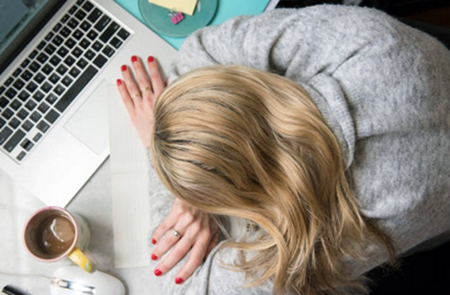How to deal with sleepiness if you always want to sleep?


Many people are familiar with the problem of increased sleepiness. Do you often catch yourself complaining that you constantly want to sleep, especially in the morning or after eating at lunchtime? Then this article is for you.
Constant fatigue, weakness and drowsiness mainly persecute residents of large cities. It is often referred to as chronic fatigue syndrome or urban disease.
Everyone needs sleep. Sleep is not a waste of time, as some think. It is an essential need of the body. During sleep, the body rests and restores energy for new achievements, the brain actively assimilates the received information. Quite often, namely during sleep a person finds the right solutions for an existing problem.
According to scientists, about 30-35% of people suffer from daytime drowsiness. Moreover, these are mainly young and middle-aged people, while elderly, on the contrary, are prone to insomnia. Many people constantly want to sleep not only in the morning, but also in the afternoon, and especially after a meal. The situation is standard, and there are many reasons for chronic fatigue and drowsiness, but we will list the main ones.
Sleepiness and lethargy undoubtedly negatively affect the quality of life. A person becomes distracted, inattentive, loses interest in life and entertainment. They want one thing - sleep. Let’s figure out how can you cope with it effectively.
The main causes of increased weakness and fatigue

1. Chronic fatigue syndrome is the main and most common reason why modern people are so sleepy, especially in the morning. You get up at 6-7 o'clock, come home from work only after 8 PM and have to do a lot of chores and find time for your loved ones. As a result you find yourself in bed after midnight. And after that you still wonder why you want to sleep.
2. Low blood pressure is the next reason for constant sleepiness and weakness. People with low blood pressure need to sleep for at least 8-9 hours, otherwise they will constantly experience fatigue, lethargy and general weakness.
3. Depression can also cause drowsiness. Sleep in this case is a defensive reaction - you sleep more, less thoughts are spinning in your head. Moreover, it can be very difficult to get rid of the desire to sleep if you do not eliminate the main problem - depression.
4. Vitamin deficiency. Lack of vitamins causes weakness, apathy, dizziness, lethargy. Most often, we suffer from vitamin deficiency in winter and spring. So, for example, you may have a lack of iron in the body (anemia), a lack of iodine (hypothyroidism), a lack of vitamins B and C - all this makes you want to sleep all the time.
5. An important reason for constant sleepiness is a decrease in immunity. You can increase it with the help of vitamins, walking in the fresh air, contrast shower, gymnastics, and a healthy lifestyle.
6. During pregnancy, weakness and drowsiness also appear. The body at this time suffers not only from chronic fatigue and hormonal stress, but also due to the lack of many useful trace elements and vitamins, which is why it is advisable to drink special vitamin and mineral complexes during pregnancy.
How to get rid of sleepiness?
The problem of sleepiness is not as simple as it seems to people who do not suffer from it. Sleeping on the move, while driving is very dangerous for life and health. We become distracted and inattentive, make gross mistakes at work. We try to cheer up, but it doesn't work.
What to do to not want to sleep all the time?

1. Start taking a complex of multivitamins - perhaps you have vitamin deficiency. Ideally, you need to take an analysis for the content of vitamins and trace elements in the blood.
2. Do not overuse energy drinks. Energy drinks, of course, will help you to energize up for a while and return to work and business, but they are harmful to the stomach and heart. In addition, after the burst of energy, fatigue comes again. A cup of natural coffee will help to recover after a sleepless night. Drink another one at lunch if the effect of the first one wears out but avoid highly caffeinated and high-sugar energy drinks.
Small amounts of natural coffee will also be useful for people with low blood pressure, suffering from drowsiness and weakness, as well as dizziness in the morning. But it is better to refrain from coffee during pregnancy. Another source of healthy caffeine is green tea, which also contains many useful trace elements.
3. A contrast shower in the morning and in the evening after work will give you a charge of vivacity, relieve stress and fatigue. Start accustoming yourself to the shower gradually, from 1-2 minutes, by adjusting the water temperature. To feel more alert, it is recommended to wash your face with cool water in the morning.

4. Physcal exercise is the most effective and proven way to help you fight lethargy and sleepiness. A small 10-15 minute workout in the morning and evening will keep your muscles and joints in shape, and you will return vigor. You should not do any super-difficult exercises, just a little warm-up - and you are cheerful all day.
5. In order not to want to constantly sleep, you need to observe the correct sleep pattern. Sleep should be at least 7-8 hours, depending on your needs. The ideal time period is to fall asleep from 22-23 hours and wake up from 6-8 in the morning. And you need to train yourself to go to bed at the same time.
6. Often people cannot get enough sleep because they cannot fall asleep right away. Before going to bed, ventilate the room, give up caffeinated drinks 2-3 hours before planned bed time, take a relaxing bath, listen to calm music, read. Buy yourself a comfortable orthopedic pillow and try to get all thoughts and worries out of your head. Besides, it is advised to turn off blue light sources (your phone, laptop, etc.) at least one hour before going to bed to promote the release of sleep hormone melatonin.
7. You may simply do not have enough oxygen. People begin to yawn in the office during oxygen deprivation and lack of fresh air. What to do? Ventilate the room, go outside for 5-10 minutes at least once every 2 hours, do not have lunch at the table, but take short walks.
To cheer up at work, you can do a little exercise or warm-up. If in the room you do not have such an opportunity, then at your disposal is a lockable cubicle in the toilet, where no one will see or disturb you. It is enough to do 15-20 squats - you will not have time to sweat, but disperse the blood.
8. Aromatherapy will also help get rid of sleepiness. Buy flavoring and invigorating oils (coffee, mint, sea, spruce scents). These scents invigorate and improve mood, relieve fatigue.

If even getting enough night rest and following these tips you still suffer from excessive daytime sleepiness, you can try an antinarcoleptic wakefulness-promoting drug Armodafinil. The medication is not a stimulant as it does not promote the release of wakefulness-promoting (certain neurotransmitters) substances but simply maintains their level. The medication is called a “smart drug” because it also improves cognitive functions and makes you be able to focus, improves memory, and so on without causing an addiction. You can find more information about the medication at the product page.
Post is made based on the information provided by: John De Vries, clinical pshychiatrist, Amsterdam, Netherlands
(Updated at Apr 13 / 2024)